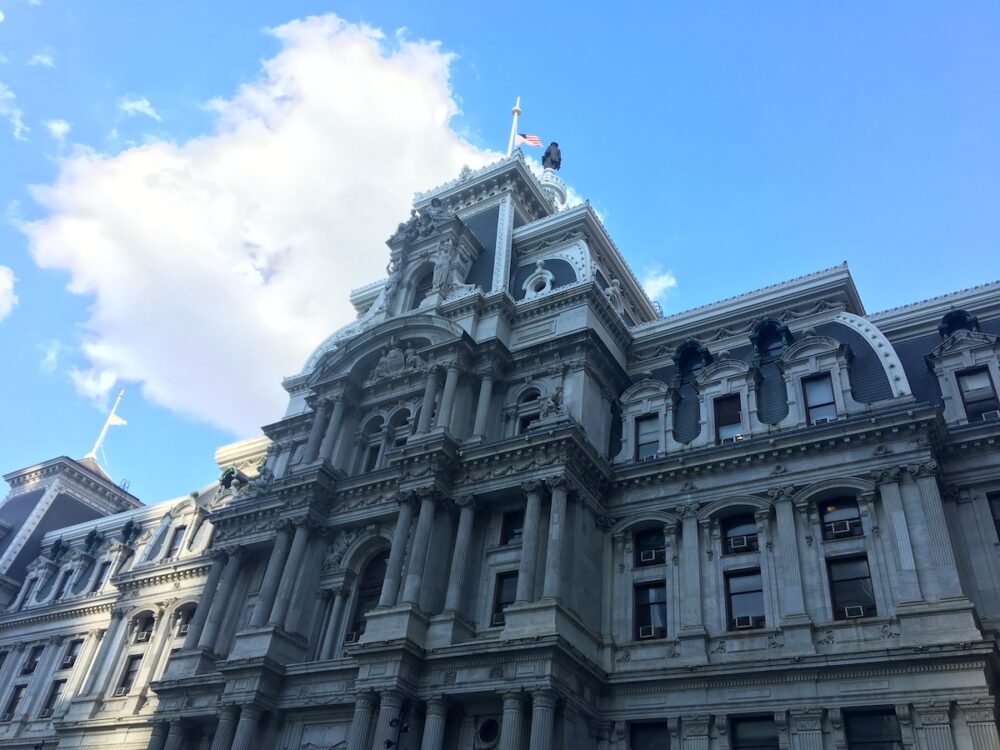Since launching the Operations Transformation Fund (OTF) in 2021, the nearly $10 million fund has invested in 29 projects across city departments, including 11 in the first cohort and 18 in the second. The fund selected projects through a competitive process aiming to improve services for Philadelphians and make government processes more efficient.
As of October, $8.64 million from the fund has been allocated for projects with goals such as increasing awareness for workers rights and supporting environmental justice in Southwest Philly. In 2022, the City released a dashboard to track the progress of the projects; collectively, they’re 83% completed.
Projects which “to the general public might not seem very transformational are extraordinarily transformational to the departments and their ability to provide services to residents and businesses and whomever else is their constituent,” Philadelphia Chief Administrative Officer Stephanie Tipton told Technical.ly.
The City released a report and video last month reviewing the last two years of OTF. Two key takeaways from the project, per Tipton, have been the importance of focusing on projects driven by employees, and offering support to projects by having a central place for “project delivery assistance.”
Read the ReportAviva Tevah, chief of staff for CAO, said the office released this report and video to provide transparency around how the money was allocated and the progress and outcomes of those initiatives.
Candace Chewning is the project lead for the Office of Worker Protections’ Community Education and Outreach Fund, a project from OTF’s second cohort. Her department used the funding to partner with 14 organizations across the city to do community outreach and provide education about Philly’s worker protection laws. The Office of Worker Protections offered $16,000 in grants to these community partner orgs.
The OTF funding helped the department develop their idea into a full program — and showed community organizations that the City was invested in working with them, Chewning said.
“We engaged our partners and asked for their opinions before this program had started,” she said. “We designed this program based off of what they told us would be beneficial in order for them to be partners with our office in a meaningful way. I think that the OTF programming was a big part of that.”
“There are these ideas out there that are transformational, and that they might just need different supports to get to the point of being ready to implement.”Aviva Tevah City of Philadelphia Office of the Chief Administrative Officer
The Office of Sustainability’s Place Based Framework for Environmental Justice project was part of OTF’s first cohort, said Taylor Quinland, program strategist for place-based initiatives for the agency.
This project helped fund resources, including Quinland’s position, for increased collaboration and communication with the Eastwick neighborhood in Southwest Philadelphia regarding environmental issues and recovery from natural disasters.
“We’re working to evaluate a suite of options that could help Eastwick and that involves planning through the next 10 or so years,” Quinland said. “So we’re definitely still continuing and sort of at a point where we can begin to show residents … certain plans and ideas.”
While most of these projects are implemented, they’re still young, so CAO plans to continue using its dashboard to report progress and outcomes of each project, Tipton said. They also plan to continue putting money toward a fund that departments can apply for to compensate residents who are assisting with projects, as CAO encourages community engagement with these projects.
As of now, there isn’t funding to support future OTF cohorts, but the office plans to work with Mayor-Elect Cherelle Parker’s administration to put in a budget request to keep the fund going, per Tipton.
If CAO is able to continue the OTF, Tevah said, the team hopes to have more time to workshop project ideas and accept projects that are at earlier stages; this time around, they had a short timeline and were restricted to choosing projects that were more fleshed out.
“There are these ideas out there that are transformational, and that they might just need different supports to get to the point of being ready to implement,” Tevah said. “It would be really, really exciting to be able to get an idea from an even earlier phase into a project plan.”
Sarah Huffman is a 2022-2024 corps member for Report for America, an initiative of The Groundtruth Project that pairs young journalists with local newsrooms. This position is supported by the Lenfest Institute for Journalism.Before you go...
Please consider supporting Technical.ly to keep our independent journalism strong. Unlike most business-focused media outlets, we don’t have a paywall. Instead, we count on your personal and organizational support.
3 ways to support our work:- Contribute to the Journalism Fund. Charitable giving ensures our information remains free and accessible for residents to discover workforce programs and entrepreneurship pathways. This includes philanthropic grants and individual tax-deductible donations from readers like you.
- Use our Preferred Partners. Our directory of vetted providers offers high-quality recommendations for services our readers need, and each referral supports our journalism.
- Use our services. If you need entrepreneurs and tech leaders to buy your services, are seeking technologists to hire or want more professionals to know about your ecosystem, Technical.ly has the biggest and most engaged audience in the mid-Atlantic. We help companies tell their stories and answer big questions to meet and serve our community.
Join our growing Slack community
Join 5,000 tech professionals and entrepreneurs in our community Slack today!

The person charged in the UnitedHealthcare CEO shooting had a ton of tech connections

From rejection to innovation: How I built a tool to beat AI hiring algorithms at their own game

The looming TikTok ban doesn’t strike financial fear into the hearts of creators — it’s community they’re worried about




